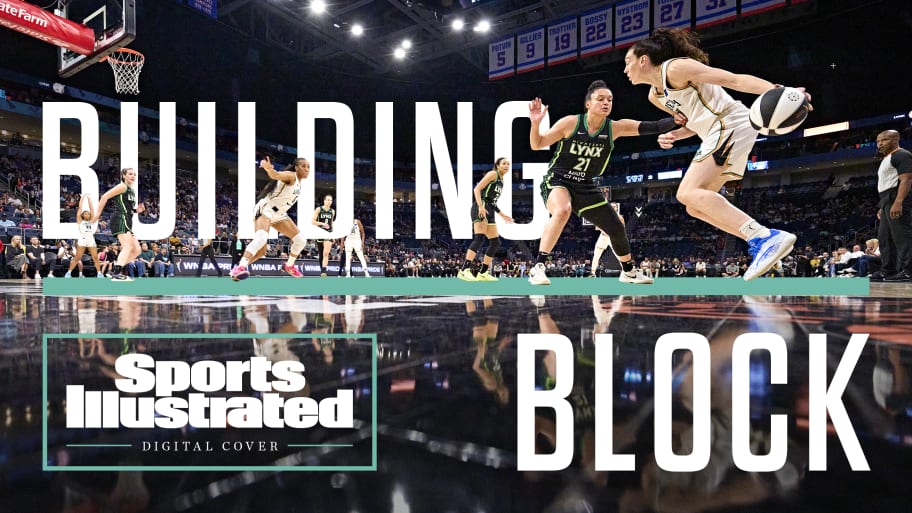
Breanna Stewart adored her father-in-law, Josep Xargay, a basketball superfan who rooted for two players with everything he had. He hardly ever missed a game, not even during his daughter Marta’s stints with the Spanish national team as it traveled all over the world and won an Olympic silver medal.
He flew to Bangkok and Arizona to watch Marta play, and to Seattle and New York City to cheer for her wife, known worldwide as Stewie, morphing his passport into a collage of love and basketball.
He did, at least, until the diagnosis. Lung cancer. Prognosis: grim.
Even when Josep couldn’t leave his hospital bed in Spain last fall, he wanted to tune in to Stewie’s games more than anything. When he could, he cheered so loudly that patients in adjacent rooms couldn’t help but follow the Liberty, Stewart’s new team after six remarkably successful seasons with the Storm. When he couldn’t, Josep dialed Marta afterward in anger—at his pain, mostly, and what it had begun to cost him.
His daughter pauses over a Zoom call, eight months later, her grief from last October still acute. “I’m sorry,” she says, unnecessarily. “Good memories, you know.” But everything happened so fast.
“Life,” Stewie says, “[was] really life-ing.”
Never more than last October. Game 1 of the WNBA Finals took place on Sunday the 8th. Seven days earlier, Josep had still been superfanning in the hospital, and that night he saw his daughter-in-law push the Liberty past the Sun in the semifinals, setting up a clash with their rival (Las Vegas) and hers (Aces forward A’ja Wilson). Marta was back home, spending all the time she could with her ailing father, and nine months pregnant with her and Stewie’s second child.
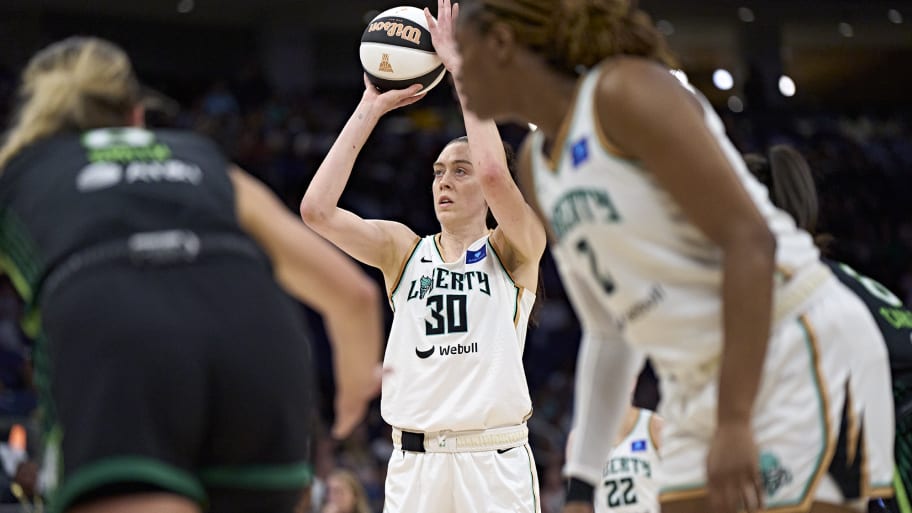
That week, between the semis and the finals, video calls were dominated by reminiscing. Josep oozed pride, in both of them and what they’d built. In Stewie, he saw someone who had transformed Marta’s life, made her happier, a mom, complete. Stewie, he said in Spanish as Marta translated, fought for what she wanted and fought for others. When Stewart won her second MVP award last season, he cried. Not just for her. For all of them.
As that week wore on, though, his health took a sudden downturn. On his last call with Stewie, he told Marta to tell her, “Don’t be sad.” To enjoy the Finals, regardless. To go out … ball … and win the whole damn thing.
There’s Stewie, on another video call in mid-June, the picture on her screen turned off. She had arrived home in the middle of the night, after the Liberty’s charter flight landed late.
In the weeks ahead, she would do she always does, which is everything, for everyone: win games, score points at record clips, lead the Liberty, and pivot to the Olympics; win another gold medal, her third, in Paris; be named one of the top five women’s basketball players in that tournament; continue to shape the off-season 3-on-3 league, Unrivaled, she co-founded with Olympica teammate Napheesa Collier; and return to New York, where the Liberty sit atop the Eastern Conference at 21–4 coming out of the break.
She’s 29 now, which means, as she collects a dizzying tally of accomplishments, there are still two young children to care for and another game upcoming. She sounds groggy. But she’s still marveling at the year that was, all that life-ing—awards, Finals run, MVP, a second child, staggering grief, overwhelming joy and the one shot she most wishes she had taken but did not.
Rest? Ha! That’s never been her default. Even if it were, now’s really not the time. Like every other athletics obsessive on the planet, Stewie understands that women’s sports in general and the WNBA specifically are both having moments. Meaning: upticks in viewership, engagement and every other metric that measures interest. Meaning: sold-out arenas, even before this season’s much-hyped rookie draft class. Meaning: Serena Williams and Coco Gauff, Simone Biles, the USWNT, Mikaela Shiffrin, Nelly Korda, Stewart, Wilson and the rest.
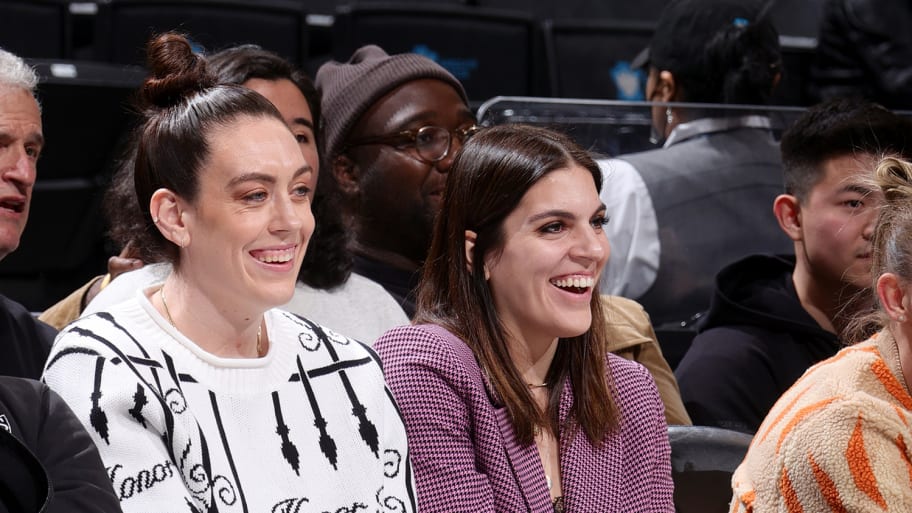
Speaking about the W specifically, Stewie says, “It’s like, We told you so. We’ve been here. We’ve had the product. We haven’t been as mainstreamed as we should have.”
For decades now, WNBA luminaries have dismissed the context-ignoring argument that always centered on the same outdated, misogynistic concept: that their league would never reach the same level of popularity as any of the so-called major sports. They’ve answered that criticism by noting the length of the respective runways for the others: MLB (1876), NFL (1920), NBA (1946). The WNBA’s first season was 1997. None of those leagues exploded immediately into the national athletic consciousness. The WNBA put forth a quality product, with a loyal, if limited, fan base, right from the jump. It only needed what all the other leagues did: time.
Good luck finding a comparison to Stewart in those sports. In the early days of each of the so-called Big Three, stars competed amid limited news coverage, minimal (if any) television exposure and no social media accounts. Stewie has already reached a level of worldwide fame far beyond anything any of them possessed.
“We are,” she says, “in a territory of our own right now.”
South Carolina coach Dawn Staley summarized the movement and its breakneck momentum best when she wore a black T-shirt with EVERYONE WATCHES WOMEN’S SPORTS slapped across the front. Jason Sudeikis—Ted Lasso himself—donned the same at the NCAA tournament. Sue Bird gave another to Jimmy Fallon on The Tonight Show.
None of that mattered last October, though, as the Liberty prepared to head to Sin City for Game 1. On the day that Stewie flew across the country, her father-in-law died. She could handle it, like she always handled everything.
“Stewie has done some incredible, big, iconic things,” says her agent, Lindsay Kagawa Colas. “But for so much of that, she has been carrying an unseen load, with so much grace. She’s also a human being.”
Stewie always wanted children, a notion she first considered as a prodigious hoopster growing up in Syracuse, where she played for the high school team at Cicero-North as an eighth-grader and dunked in her junior season. Between high school and college, she won six championships, including the four she predicted at powerhouse Connecticut.
That’s what Stewie did. She won—everything. Premier showcases. Naismith Prep Player of the Year. USA Basketball Female Athlete of the Year, three times. Gatorade National Player of the Year. Naismith College Player of the Year, three times. She won championships with the Storm, in the Russian Premier League, in the Turkish Premier League. Won regular season MVPs and Finals MVPs and made the WNBA’s 25th anniversary team.
She met Marta in 2018, while both played in Russia for Dynamo Kursk. Their courtship moved slowly, until Stewie ruptured an Achilles tendon the next spring. The injury gave them time to forge a deeper connection. Two years later, on a hike in Arizona, Stewie stopped abruptly, and proposed.
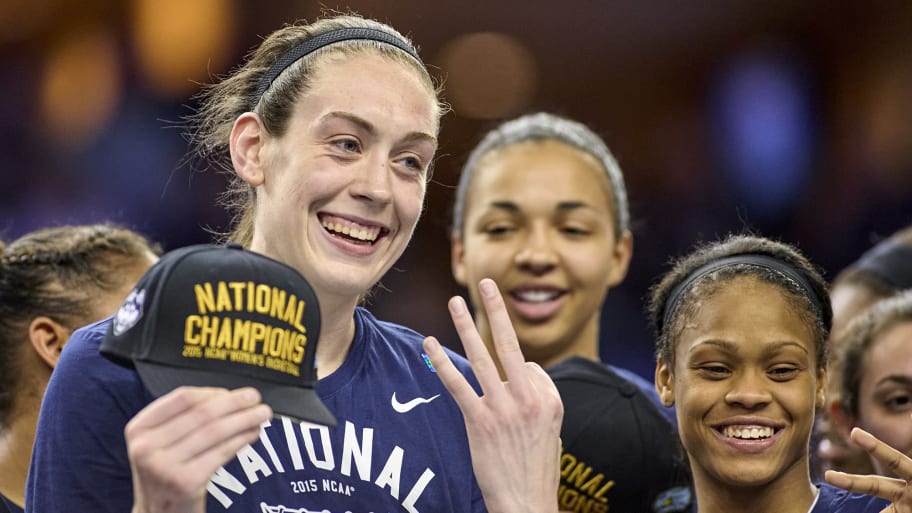
Marta, now 33 and retired from the game, pushed Stewie to place all the winning where it belonged: as a top priority, undoubtedly, but not the sole way to define a meaningful life. When the WNBA played a bubble season during the global pandemic in the summer of 2020, the couple decided to expand their family.
A year later, Stewie picked up a second Olympic gold in Tokyo, flew home and became a mom. Josep and his wife, Montse, were there for the birth of the couple’s first child. Ruby, who was born via surrogate, delayed her arrival just long enough for Stewie to make it.
Stewie adored mom life. Ruby took to PAW Patrol, obsessing over the fire-fighting pup in red, Marshall. She visited Disney World, where a Frozen-themed boat ride proved scary, but she still couldn’t wipe away the joy so obvious on her little face.
Before last season, all three moved across the country for a basketball homecoming. In Seattle, Stewie had won everything and formed a dynamic partnership with Bird. But with her partner in dominance retiring, Stewie desired change. In February 2023 she signed with the Liberty, an original WNBA franchise—the only OG that hadn’t won a title, despite making four Finals, but none since ’02.
With urging from her better half, Stewie broadened her skill set. She made point barrages normal; scored the second-most points ever in a season; recorded four games with 40 or more scored (a record). One night, she became the first WNBA player to record at least 25 points, five rebounds and five assists—in one half. She reached 4,000 points faster than any player in league history. “She’s the best player in the world,” Marta says, her opinion biased but qualified. “Who does that?”
Amid the brokenhearted stretch last October, Stewie did fly the day her father-in-law died. As much as she wanted to, she couldn’t go to Spain to tend to her pregnant, grieving wife. She had to honor her father-in-law’s last wish and try to bring her team a title. She says she didn’t play well in those Finals—relative, of course, to her own impossible standard. “My world got rocked,” she says. “I don’t think I handled it the best way, the way I should have. I don’t think I was managing my mental side.”
Tough, sad, hopeless, determined but unable to fulfill that determination. Stewie felt all those things. Life continued life-ing. “I just went crazy,” she says.
Down 2–1 in the series with the Aces, she held the ball with 8.8 seconds left, Liberty down by one, season at stake, a sellout home crowd begging for another game. This exact situation was all Stewie ever wanted, from the day she first held a basketball. Instead of shooting, though, she passed the ball. Missed jumper. Series over. Aces for Las Vegas; deuces for New York.
Stewie wanted to be there for her team. Wanted to be there for her family. She was, for all. Just not as much, for either, as she wanted or they needed. Her scoring average (16.3) and shooting percentage (36.2) in the series were both far below her career marks. “I wasn’t my best, and that really bothers me,” she says.
What a month: father-in-law dies (Oct. 6), season of great promise ends in collapse (Oct. 18), birth of second child (Oct. 25). Stewie isn’t on this call to make excuses. They simply form her reality, what happened, everything, all at the same time.
Stewie’s superpower is authenticity. It permeates her every interaction. It’s clear not just in her signature Puma shoes, the first in the WNBA in more than 10 years, the aptly named Stewie 1’s. It’s clear in her input into their design. The flourishes drip with meaning: red carnation blooms (Spain), cherry blossoms (Tokyo, for her second Olympic medal); a golden trumpet tree (Brazil, for her first).
It’s also clear in her off-court advocacy, whether supporting movements like Black Lives Matter or her starring role in the documentary Shattered Glass, which spotlights the efforts of the WNBA players’ union. She worked on the last collective bargaining agreement, signed in 2019, which featured a 53% increase in salaries, added maternity/fertility benefits and created an in-season tournament, the Commissioner’s Cup, with a $50,000 prize pool.
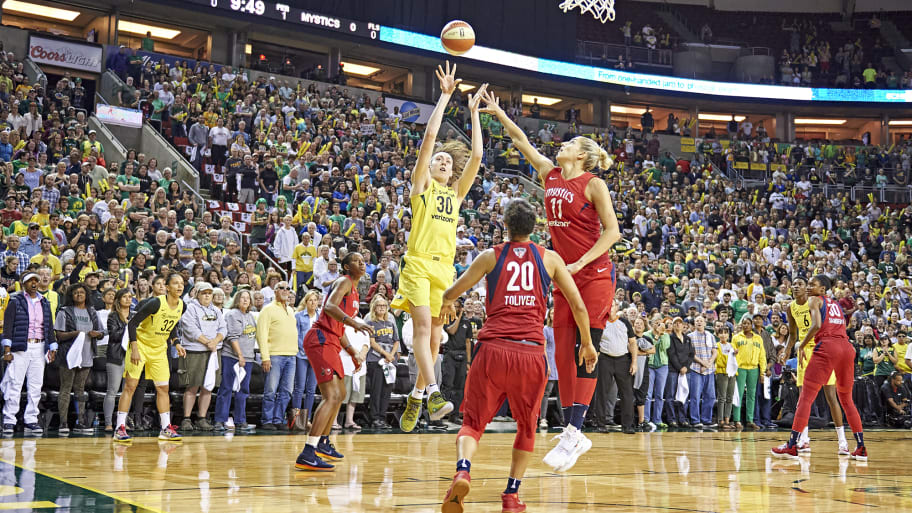
It took years for the league to evolve to here, powered by its original group of superstars. Early on, Stewie says, “It wasn’t like the WNBA always had our backs.” As the landscape changed, so did the league’s support, in her view. In the last CBA, they turbocharged momentum: super-max contracts for the first time, higher-than-ever rookie salaries, no more sharing rooms on the road. “The W was [always] this league where players are constantly fighting for something,” she says. “And we need to fight for them.”
The WNBA also is, inarguably, more popular than ever. This season’s rookie class, headlined by Caitlin Clark and Angel Reese, seized on—and heightened—momentum. They all owe Stewart, now in her eighth WNBA season, and other stars from her generation. They’re not the OGs, who toiled with little resources. Nor the newcomers, enjoying two decades of hard-earned progress. “She’s the bridge between them,” Colas says, “and a powerful vehicle into the future.”
Without Stewie’s generation, there’s no Clark skit on Saturday Night Live. No highest-level interest from companies like Nike, no eight-figure endorsement deals. No $76,535 salary—Clark’s, this season—the highest ever for a rookie. Stewie embodies what the WNBA is: the most inclusive of American sports leagues, growing, vulnerable, adjusting to new realities and picking up new fans every week. She’s not afraid to espouse unpopular opinions, even though women athletes who do so tend to be more vilified than men.
When Stewie stumbles upon arguments about Clark’s contract, she wants sports fans to understand how far the WNBA has come for someone to think that Clark, in her first season, makes too little. “Welcome to the table,” Stewie says.
As Clark sank jumpers en route to last season’s NCAA championship game, comparisons ballooned into hyperbole. On Sirius XM, Stewie said that, in order for Clark to become the greatest female college player ever, she needed to win a title. She wasn’t trying to be mean. She was being honest, not advocating for herself but for a group—including Candace Parker, Diana Taurasi and others—of worthy candidates. The internet, vast space of reason and compassion that it is, reacted poorly. On some level, the hateful response stung. Stewie doesn’t come out and say that, describing the reaction as “progress,” equal to the nonsense male athletes encounter daily. If it has impacted her, as those around her maintain, she has remained focused, her lens wider, pointed only forward.
“You have to have positive and negative in order to continue to [grow],” Stewart says. “We’re never going to get to the point we want [to reach] unless we can.”
Colas watched the kerfuffle spin through the opinion-mongering cycle. She considered the growth and the acceptance that took decades to realize. Neither would exist, she says, without bad takes. “Talk about all the people new [to this space] and their sensitivity, and they’re acting like they’re Christopher Columbus discovering America, right?” she says. “Stewie has been here, right? That’s part of equity—and part of the coverage and visibility we’ve been asking for.”
Rivalries don’t hurt, either. Especially when Stewie says that women’s sports will follow the same trajectory as men’s did—more media coverage, new stadiums, bigger TV deals and everything else. They’ll be major, in every sense—and soon.
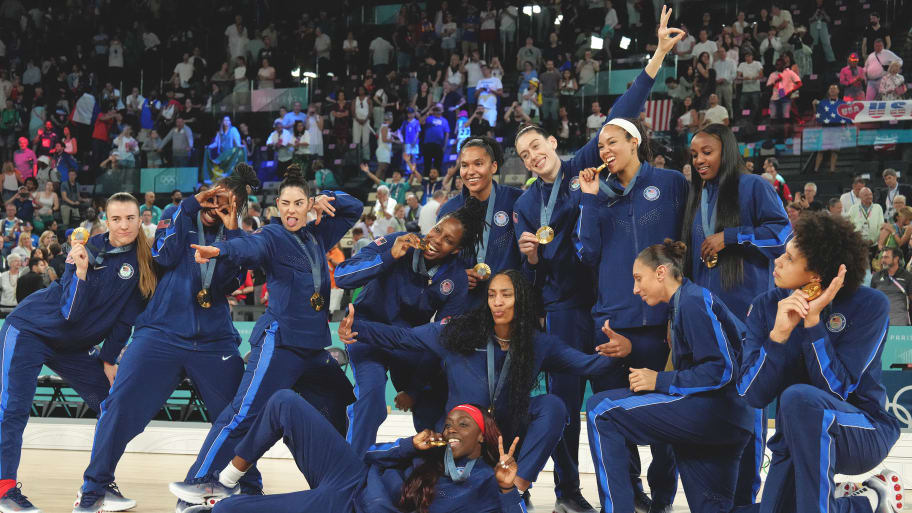
Early in training camp, on the eve of another season, the Liberty players went to dinner. Each answered the same questions: one thing they were proud of from the previous season, one thing they wished they could change and one thing they regretted.
Stewie had one regret—that she didn’t open up to teammates before or during the Finals, wasn’t vulnerable, couldn’t explain all that she was carrying, the weight too heavy to bear. She knew they would have been there for her, would have helped. The sentiment doubled as her answer for what she would have changed. She would have opened up, would have addressed both mental toll and personal anguish. She doesn’t regret anything, though, especially being there for Marta. Well, that and the shot she didn’t take.
As for what she was proud of, Stewie focused on families and loved ones and support. Marta taught her that moments matter, even when they’re not triumphs, that real humans show up for their loved ones, and not because they want to. Because they must.
Tears began to well in their eyes. The dinner went so well, in fact, that the Liberty turned it into regular “culture” meetings, player-led discussions and team-wide deep dives that fortify bonds and create critical understanding. Stewie detailed sessions with her sports psychologist this offseason, encouraging teammates to be open.
“It was nice,” Stewie says of the dinner. “It was bothering me, really, the entire offseason.”
That dinner “helped her for this season,” Marta says. “To be motivated … an even better player. But also to win this championship; [she wants it] even more than last year.”
Stewie has backed her words with actions. In re-signing with the Liberty, she did not demand the super-max contract she deserved. She took a “non-guaranteed” roster spot. This cost her some cash but allowed New York to sign six other veterans and retain towering, talented forward Jonquel Jones. They started 16–3, seizing control of the Eastern Conference.
Both Stewie and Marta say that last October strengthened their marriage. “I knew she gave up a lot to be there for me,” Marta says. She’s crying again, the tears happier. “When it comes to Stewie, people think she’s kind of a robot. Now, more people realize that she can have bad moments; it’s not easy. She was trying so hard to win, to make my dad proud.”
“When we make our next Finals run,” Stewie says, “I’ll be better.” If that happens this season, with this team, in that city, it would, she says, be “the most New York way possible” to triumph.
Ruby, who just turned 3, insists on going to as many games as possible. Keeping her seated has proven as difficult as guarding professional scorers, Marta learned. Sometimes, Ruby claps when the opponent scores. This season, she watched her mom become the fastest player in WNBA history to make at least 400 three-pointers and block at least 350 shots in a career.
Stewie is grateful but not done. There’s another CBA to complete, potentially after this season. Diapers to change. Arenas to sell out. Shoes to design. Games to win. Ambition to expand. Stories to tell. New fans to indoctrinate. Voices demanding to be heard. WNBA loyalists to affirm. Liberty fans starving for rewards. “She wants to win,” Marta says. Only now, Colas says, Stewie understands the “power of sharing.” What if her worst loss becomes her most significant victory, as she ushers in an era of exponential progress? Colas represents most of the WNBA’s stars. Years from now, she believes the sports world will look back at Stewie’s career and see a pioneer.
For now, Stewie desires to define this season by a single number: three. She just won her third Olympic gold medal. Wants to win her third WNBA title, when another Finals series tips off in the fall, perhaps upending a budding dynasty in Las Vegas in the process. Wants to show up for the other three members of her immediate family.
She finds herself half proud of the progress made by female athletes and leagues like the WNBA. Half too busy to care about perception, reactions, being right. “I don’t know if there will ever be a moment where it’s good enough,” she says. “It’s a mix of both. Sometimes, it’s like, did it have to be this hard?”
The couple welcomed their second child on Oct. 25. The worst month. The best thing. The boy was huge, weighing in at 11 pounds, 12 ounces. His name: Theo Josep.
This article was originally published on www.si.com as Breanna Stewart Is Bridging the Gap in Women’s Basketball.







